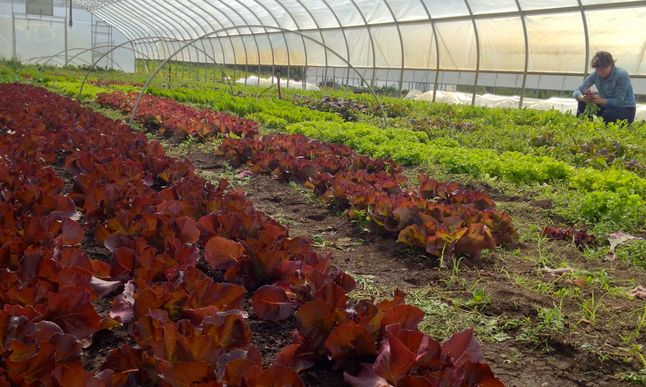Seeley Farm points the way to a new food system in Washtenaw County

Alex Cacciari of Seeley Farm harvesting greens for market
Kim Bayer | AnnArbor.com Contributor
You wouldn't know it to look in the well-stocked grocery stores, and you might only guess at it when you're driving around on country roads, but even in this very agricultural area, we're not growing much food here for the 350,000 people who live in Washtenaw County.
According to the Michigan Department of Agriculture's County Food System Profiles — last updated in 2009 — Washtenaw County has more than 1,300 farms with approximately 167,000 acres of farmland. Of that farmland, 60 percent, or 99,000 acres, is planted in commodity crops — corn, soy and wheat — that will be processed or turned into animal food.
At the same time, just a little more than 1 percent of Washtenaw County's cropland, or 2000 acres, grows vegetables for your dinnertime. It's the same across the country — croplands are growing mountains of commodities, and only a fraction of the healthy foods that could begin to address the epidemic of diet-related disease in this country. In fact, according to the American Farmland Trust, "The United States needs 13 million more acres of fruits and vegetables to meet the RDA."
Related to the fact that we're not growing enough fruits and vegetables to meet a minimum standard set by the USDA for a healthy diet, there is a problem that's even more invisible and insidious: we're not growing many farmers these days. In the late 1700s, 90 percent of America's population was farmers. While it's true that we don't need an entire country growing food any more, the number of farmers currently is only 2 percent of the population. We have too few farmers to have their own census category any more.
Even though Washtenaw County does not grow enough food to feed its own population, there are many encouraging developments pointing to a stronger food system here. For example, at the Tilian Farm Development Center, a new farm incubator created by Ann Arbor Township, the Food System Economic Partnership and Selma Cafe, a successful first cohort of young farmers is graduating into their own farm businesses this year. Among these are Mike Nowak and Alex Cacciari who conceived Seeley Farm at Tilian in 2011.
Seeley Farm specializes in beautiful, multi-hued and textured salad greens. Alex says, "We sneak a lot of unexpected varieties in our salads, like baby kale, fennel fronds, amaranth. But salad is like the great equalizer. Many people, even those that don't eat a lot of vegetables, can bring themselves to eat a salad — it's a recognizable thing."
Alex and Mark sell their produce at the Ann Arbor Farmer's Market, as well as in stores like the People's Food Coop, Arbor Farms Market, the Ypsi Food Coop, The Produce Station, babo Market and Plum Market.
Alex says of the early days at Tilian, "We worked incredibly long days, both on our own business as well as getting Tilian going. We built four hoophouses, a wash/pack facility, two walk-in coolers, developed a driveway, spread many many yards of compost, cleaned up and improved the historic barn on-site, and more. We invested a lot in the Tilian organization and the township property it sits on, and we were all so happy and grateful to be there. Tilian gave us land and infrastructure for two years so we didn't have to take that financial leap ourselves. With Tilian we could delay those capital expenses early on in our business, while we were getting started."
Alex and Mark are now transitioning out of Tilian and have been able to lease 30 nearby acres of their own that they would like to buy. But they are also facing some of their biggest challenges so far, like needing to get the business licensed as a wholesale food processor because they want to wash their greens. Because all farms are now assumed to harbor the hazards of factory farms, the couple must navigate a baffling maze of requirements for food safety as if they were an industrial-scale operation.
In addition, Alex says, "Another greater challenge right now is achieving farm ownership. We currently hold a two-year lease on our land, which in farming years is like five minutes. We would very much like to own our property, but the challenges to that are many."
It's clear that the system as it's currently set up imposes monumental challenges for young farmers, so it's no surprise their numbers are dwindling across the nation. The rewards inherent in a farming life must have to be incredibly sustaining to Alex and Mark for the strength they need to scale the barriers. If only for the pure self-interest of having the security of food growing nearby, I wonder how the larger community could, like Ann Arbor Township, do more to smooth the path for committed young farmers like Alex and Mark who are willing to work unbelievably hard.
On March 15 this year, Alex and Mark's son Henry was born. They say, "His presence drives us to work that much harder and have the business support our new family well. Most farmers don't get into farming for the money, but no one can last very long working this hard with nothing to show for it. Owning our farm has always been very compelling to us, but is all the more now that we have a future steward of this land to bestow it to."
Kim Bayer is a freelance writer and culinary researcher. Email her at kimbayer at gmail dot com.


Comments
bluetonguedlizard
Tue, May 14, 2013 : 5:40 p.m.
Love Seeley Farm, thanks for this lovely article.